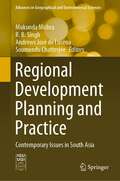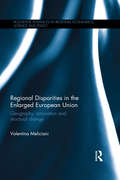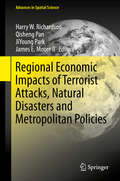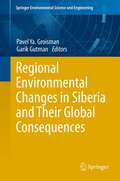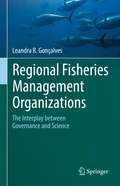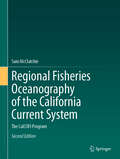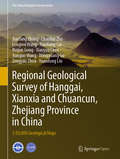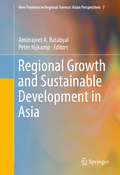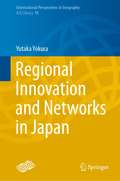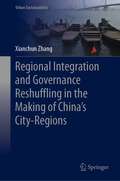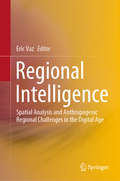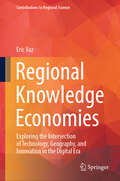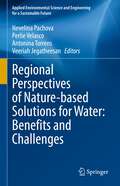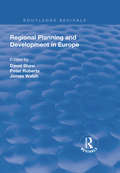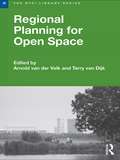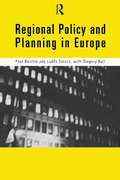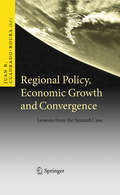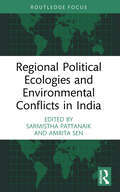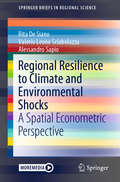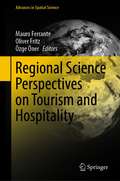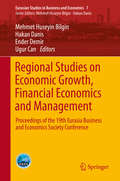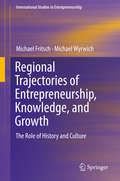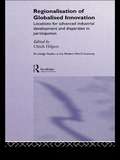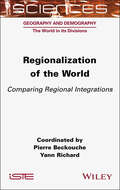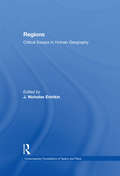- Table View
- List View
Regional Development Planning and Practice: Contemporary Issues in South Asia (Advances in Geographical and Environmental Sciences)
by Mukunda Mishra R. B. Singh Andrews José de Lucena Soumendu ChatterjeeThis book, through a bunch of systematic and analytical notes and scientific commentaries, acquaints the readers with the innovative methods of regional development, measurement of the development in regional scale, regional development models, and policy prescriptions. Conceptualizing development as a regional process is a geographer's brainchild, and the sense of region has long been rooted deeply in the fundamental research practices that geographers are accustomed to. The geographical perspective of regions entails conceptualizing them nested horizontally as the formal region and hierarchical relationships in space with spatial flows or interactions as the functional region. In geographical research, the region works as a tool by serving as a statistical unit of analysis. More importantly, however, regions serve as the fundamental spatial units of management and planning by specifying a territory or a part of it for which a certain spatial development or regulatory plan is sought. This book addresses the complex processes in different regions of the world, particularly South Asia, to perceive the regional development planning involved and the sustainable management practiced there. The book is a useful resource for socio-economic planners, policymakers, and policy researchers.
Regional Disparities in the Enlarged European Union: Geography, innovation and structural change (Routledge Advances in Regional Economics, Science and Policy)
by Valentina MelicianiThe last twenty years have seen an increase in European integration and the emergence of the technological revolution. Although tighter integration coupled with technological innovation should facilitate cross-regional convergence, some European regions have managed to jump ahead while others have been left behind. This book examines the regional characteristics that favour growth and analyses the relevance of innovation, socio-economic and structural factors in shaping regional economic disparities. In this book, particular attention is devoted to the EU enlargement towards the East, to its consequences on Europe’s traditional North-South divide, and to the increasing regional disparities in new member states after the transition. It demonstrates the growing importance of innovation and human capital in explaining the increase in income and employment disparities in old EU members, particularly after the 2008 financial crisis. It also shows that for newcomers, regional disparities are essentially linked to socio-economic factors as capital regions approach Western standards, while others - mainly old industrial regions and peripheral ones - lag behind. This book integrates theoretical discussion with empirical evidence and will appeal to regional scientists interested in regional inequalities, and to policy makers concerned with devising effective strategies to tackle regional disparities in Europe.
Regional Economic Impacts of Terrorist Attacks, Natural Disasters and Metropolitan Policies
by Harry W. Richardson Qisheng Pan Jiyoung Park James E. Moore IIThis book presents a multiregional input-output model for the metropolitan area of Southern California, which helps to estimate the economic impact of simulated terrorist attacks on seaports, malls etc. as well as of natural disasters such as earthquakes and tsunamis. The authors also analyze the economic and social effects of metropolitan policies such as growth controls, neighborhood gentrification or road-congestion charges. The model presented in the book has evolved over a period of 25 years and requires a very substantial computer capacity.
Regional Environmental Changes in Siberia and Their Global Consequences
by Garik Gutman Pavel Ya. GroismanThis volume presents a state-of-the-art assessment of the Earth's climate system in Siberia and relationships between climate, ecosystems and people in that region. Changes in climatic variables and land cover in Siberia are among the earliest indicators of the Earth's response to climate warming. The volume is a compilation of results from studies on climate, land-cover and land-use changes and their interactions with biogeochemical and water cycles, atmospheric aerosol, and human and wildlife populations in Siberia. Regional changes in Siberia are predicted to affect climate and people on a global scale. NASA, the Russian Academy of Sciences, and several European institutions have supported these studies. The primary supporter of the projects that produced the results compiled in this volume is the NASA Land-Cover/Land-Use Change Program, hence most studies use remote sensing in their research. The chapters in this volume were written by an international team of scientists from the USA, Europe and Russia under the auspices of the Northern Eurasia Earth Science Partnership Initiative (NEESPI). This book will be of interest to those involved in studying recent and ongoing changes in Siberia, be they senior scientists, early career scientists or students.
Regional Fisheries Management Organizations: The interplay between governance and science
by Leandra R. GonçalvesThis book analyzes empirical data from three specific Regional Fisheries Management Organizations (RFMOs) designed to establish rules for the conservation and management of fish stocks in the ocean, in order to assess their effectiveness in converting science into policy for the recovery and maintenance of fishery populations. The three RFMOs discussed are the CCAMLR (Convention for the Conservation of Antarctic Marine Living Resources), the ICCAT (International Commission for the Conservation of Atlantic Tunas) and the CCSBT (Commission for the Conservation of Southern Bluefin Tuna). The book seeks to understand when governments choose to listen to science, and establishes a framework to examine the institutional designs currently in place to accommodate RFMO policy suggestions and the conditions under which they are implemented successfully. The study will be of interest to academics and professionals broadly interested in global environmental governance and international relations, and will specifically appeal to policymakers, conservationists, and environmental researchers interested in fishery management and policy at the global and regional scale. Gonçalves provides an accessible and comprehensive analysis of RMFOs. She offers valuable insights into the role of science and politics in shaping sustainable fisheries policies for the open oceans. ---Peter M Haas, Professor Department of Political Science, University of Massachusetts AmherstAs envisaged by the UN Decade of Ocean proclamation, this book is an important and sincere effort, hopefully to be accompanied by many others to come during this promising decade, that will help to build a common framework to ensure that ocean science can support countries and the international community in creating improved conditions for the sustainable development of our cherished Ocean.---Fabio H. Hazin - Professor at Federal Rural University of Pernambuco, Brazil
Regional Fisheries Oceanography of the California Current System: The CalCOFI Program
by Sam McClatchieThe California Current System is one of the best studied ocean regions of the world, and the level of oceanographic information available is perhaps only surpassed by the northeast and northwest Atlantic. The current literature (later than 1993) offers no comprehensive, integrated review of the regional fisheries oceanography of the California Current System. This volume summarizes information of more than 60-year California Cooperative Oceanic Fisheries Investigation (CalCOFI). While providing a large bibliography, the intent was to extract themes relevant to current research rather than to prepare a compendious review of the literature. The work presents a useful review and reference point for multidisciplinary fisheries scientists and biological oceanographers new to working in the California Current System, and to specialists wishing to access information outside their core areas of expertise. In addition, the first editioin published in 2014 aimed to deliver an up to date reference to the current state of knowledge of fisheries oceanography in the California Current System. The second edition adds some new sections, and data visualizations. The most important new material is included in the perspectives on CalCOFI chapter. New vignettes have been added for Reuben Lasker, Ed Brinton, Abraham Fleminger, Elizabeth Venrick, and Andrew Leising. The vignette for Noelle Bowlin has been updated to reflect her position as the current NOAA lead for the CalCOFI program, and a vignette has also been added for Sam McClatchie.
Regional Geological Survey of Hanggai, Xianxia and Chuancun, Zhejiang Province in China: 1:50,000 Geological Maps (The China Geological Survey Series)
by Jianfang Zhang Chaohui Zhu Longwu Wang Xiaoliang Cai Ruijun Gong Xiaoyou Chen Jianguo Wang Mingguang Gu Zongyao Zhou Yuandong LiuThis Open Access book introduces readers to the regional geology of Hanggai, Xianxia and Chuancun, the area between China's northern Zhejiang Province and southern Anhui Province and explores the strata, magmatic rocks and tectonic structures in 1:50,000 scale geological maps. Based on studies of multiple stratigraphic divisions, the standard stratigraphic section of the upper Ordovician Hirnantian in the lower Yangtze region is established, revealing for the first time numerous “Burgess Shale-type” sponge fossils in Hirnantian strata and identifying 10 grapholite fossil belts and various fossil categories, including chitin, trilobites, gastropods, brachiopods, and cephalopods. Moreover, the book identifies for the first time Late Ordovician volcanic events in northern Zhejiang province. The work represents a major contribution to research on Paleozoic strata in the Lower Yangtze region, and sheds new light on understanding the Hirnantian glacial event and biological extinction event in South China by providing a high-precision time scale. In addition, the book opens an important avenue for future research on sponge evolution after the Cambrian life explosion. As such, it offers a unique and valuable asset for researchers and graduate students alike.
Regional Growth and Sustainable Development in Asia
by Amitrajeet A. Batabyal Peter NijkampThis book addresses two general questions that have arisen as a result of the uneven rise of the various Asian economies in contemporary times. First, to lift people out of poverty and to improve the quality of their lives, how do we institute policies that will ensure economic growth in the different regions of Asia? Second, what can we do to ensure that the economic growth we seek is sustainable so that the regional economic development that emerges is broad-based, inclusive, and environmentally conscious? Specifically, this edited book will provide a unified perspective on regional growth and sustainable development in Asia by focusing on the above two broad questions. The book will emphasize dynamic modeling and it will illustrate the role that sound theoretical and empirical modeling of an intertemporal nature can play in shedding light on salient public policy questions concerning regional growth and sustainable development. The specific topics to be addressed in this book include growth accounting, natural resource use and management, the regulation of environmental externalities, geographic information systems, and regional climate change. The individual chapters in this book will be written by international experts who are also active researchers in their respective fields. Therefore, this book is highly recommended to all readers who seek an in-depth and up-to-date perspective on some of the most salient issues at the interface of regional growth and sustainable development in Asia.
Regional Innovation and Networks in Japan (International Perspectives in Geography #16)
by Yutaka YokuraThis book provides a novel perspective on networks and innovation in the field of economic geography and presents new findings through theoretical foundations and empirical analyses. The book focuses on various temporary systems in industrial agglomerations such as joint R&D, trade fairs, business workshops, and international conferences. Following the introduction, Chapter 2 considers the mechanism of the innovation process in which networks function as institutions. Chapter 3 and succeeding chapters conduct empirical research centered on statistical data analysis such as social network analysis and covariance structure analysis, and they determine the real-world situations through interview surveys of related stakeholders. Chapter 3 considers the structure and spatial patterns of R&D networks in Japan by making the structure visible and calculating network indices. Chapter 4 concentrates on local trade fairs held in industrial agglomerations and examines the development of various relationships between related participants. Chapters 5 and 6 shed light on institutional thickness in industrial agglomerations. Chapter 7 spotlights quantitative and metrical examinations of inter-organizational relationships in terms of knowledge flows based on company-level data regarding technological alliances and ownership relationships between global corporations. The studies featured in Chapters 6 and 7 serve to evaluate how Japan’s firms have adapted to radical changes under global competition.
Regional Integration and Governance Reshuffling in the Making of China’s City-Regions (Urban Sustainability)
by Xianchun ZhangThis book for the first time thoroughly investigates the extent of economic and institutional integrations and the underlying governance reshuffling process of China’s city-regionalism. By using the Shenzhen-Dongguan-Huizhou sub-region (SDH) in southern China as an empirical case, this book provides convincing evidence that China’s city-regionalism is essentially a state-orchestrated and institution-based process. Perspectives from “market-industry-infrastructure” and multi-level governance (MLG) have been provided to systematically examine China’s city-regionalism. This book has essentially made a definitive contribution to China’s regional governance. Methodologically, it shows how China’s city-regionalism can be examined through a problem-solving and case-by-case paradigm, through building a bridge between an empirical slogan and an inclusive theoretical term for institutional integration and through MLG and its integrative approaches in China. Exhilarating findings are presented using extensive tables, graphs, and maps along with the integration of quantitative and qualitative methods. Undergraduates, graduates, and researchers who are interested in China’s city-regionalism and regional governance would be the readership of the book, and officers from different levels of government as well as policymakers will find the book inspiring.
Regional Intelligence: Spatial Analysis and Anthropogenic Regional Challenges in the Digital Age
by Eric VazRegional Intelligence is an emerging field that leverages the lessons learned through decades of regional science. By merging spatial analysis with quantitative analytical techniques in the Anthropocene, this book contributes to the multidisciplinary understanding of regional issues. The locational aspects of regional paradigms are explored through various empirical studies that promote a rich and diversified understanding of regional issues concerning policy, governance, land use, and territorial decisions. Given its scope, the book will appeal to scholars and students of regional and spatial sciences and geography, as well as practitioners and decision makers engaged in regional planning and policymaking, looking for new methodological approaches that offer insights into sustainable development, regional prosperity, and livability. As a unique contribution, this book challenges the status quo on how complex spatial problems at an international level and at multiple scales can be comprehended.
Regional Knowledge Economies: Exploring the Intersection of Technology, Geography, and Innovation in the Digital Era (Contributions to Regional Science)
by Eric VazThis book investigates the multifaceted relationships between knowledge structures, technology, geography, and regional science. This includes a scholarly exploration of the role of geographical proximity in knowledge structures (spatial spillovers), the transformative potential of the metaverse in knowledge management, and the historical and cultural influences on modern knowledge ecosystems. It further scrutinizes the impact of technology on knowledge distribution, the guiding role of institutions and organizations in knowledge societies, and the value of cultural diversity for cross-cultural knowledge exchange. Addressing complex ethical, privacy, and accessibility challenges, the book concludes by offering strategic insights for creating sustainable knowledge ecosystems, making it an invaluable resource for researchers and professionals in the intersecting domains of technology, geography, regional science, and beyond.
Regional Perspectives of Nature-based Solutions for Water: Benefits and Challenges (Applied Environmental Science and Engineering for a Sustainable Future)
by Nevelina Pachova Perlie Velasco Antonina Torrens Veeriah JegatheesanNature-based solutions (NbS) are solutions inspired or supported by nature. They include ecosystem conservation and restoration measures, as well as the creation or enhancement of natural processes in man-made ecosystems, such as cities. Recent interest in NbS has emphasized their importance for urban water management and cities across the world have begun to experiment with them. Experiences from different contexts, however, are not adequately captured and understood. This book aims to address this gap by compiling case studies and reviews that explore NbS for urban water management from different regions and perspectives and highlight emerging challenges and opportunities for harnessing their potential.
Regional Planning and Development in Europe (Routledge Revivals)
by David Shaw Peter RobertsThis title was first published in 2000: Providing a review and assessment of a number of the major features evident in regional planning and development in Europe, this volume contains a series of regional case studies, drawn from current research in various European countries. These illustrate a broad range of theoretical views, which offer perspectives on the operation of the EU Structural Funds and regional restructuring, development and key concerns evident in spatial planning an environmental management and lessons from past experience. The editors collate views to arrive at challenging conclusions and suggestions for future policy priorities.
Regional Planning for Open Space (RTPI Library Series)
by Arnold Van Der Valk Terry Van DijkReviewing the limitations of various planning options, this book addresses the debate on how to preserve open space in the context of a growing metropolis. The importance of open spaces for well-being in urban life is well-established. With case studies on internalization and valuation methods, this book critically examines the liberal discourse that urges the transfer of responsibility for open space from government to the market. European and American expert authors confront political rhetoric with grounded analysis and conclude that the market needs to be combined with governmental efforts. They scrutinize the connection between open space and the planning institutions designed to implement its policy. The book provides practical pieces of insight in how to structure an open space problem, information on what to expect from instruments, and new ideas on alternative approaches.
Regional Policy and Planning in Europe
by Paul Balchin Ludek Sykora Gregory BullRegional Policy and Planning in Europe explores the ways regional policy and planning systems across Europe have been influenced by:* economic and monetary union* the impending enlargement of the European Union* the devolution of administrative power from central government to regional authorities* the increased importance of environmental and urban issues.Presenting a comprehensive overview of the economic basis of integration, this book examines the evolution of various systems of government, planning and forms of devolution.
Regional Policy, Economic Growth and Convergence
by Juan R. Cuadrado-RouraMany European, Latin American and Asian countries have experience with regional policies aiming to reduce regional disparities in GDP per capita and/or to develop problem regions helping to recover from its GDP decrease. Spain represents, without any doubt, a very rich and interesting case-study regarding regional problems and regional development policies. The aim of this book is not only to analyze the regional policies practiced, their objectives, instruments and effects, but to provide an in-depth analysis on the impact of investments in infrastructure, human capital and other factors, as well as the advances accomplished in terms of productivity, convergence and regional competitiveness. The book particularly wants to impart knowledge, which can be useful for other countries' policy makers, as well as for academics, researchers and consultants. The contributions selected have been written by prestigious Spanish academics, most of them also having practical experience in the field.
Regional Political Ecologies and Environmental Conflicts in India (Routledge Focus on Environment and Sustainability)
by Sarmistha Pattanaik and Amrita SenThis book focuses on the regional political ecologies (RPEs) of environmental conflicts in India. It explores broadly, landscape-based analyses of political, economic and social issues, which impact environmental changes, challenges and conflicts at local and micro-local levels. The chapters in this volume examine the intervention of different stakeholders in the management of various regional ecological landscapes in India, including forests, rivers, canals, creeks and wetlands. The volume is an interdisciplinary endeavour, weaving together contextual narratives through a combination of approaches from sociology, anthropology, geography, political studies and environmental history. Using such core approaches, the book studies the place-based dynamisms within the regional environmental conflicts in the selected conservation landscapes. It provides empirical reflections on transboundary issues, rural-urban transitions, middle-class environmentalism, identity conflicts, decentralized natural resource management and the role of political institutions. Regional Political Ecologies and Environmental Conflicts in India will be of great interest to students and scholars of Political Ecology and South Asian Environmental Studies.
Regional Resilience to Climate and Environmental Shocks: A Spatial Econometric Perspective (SpringerBriefs in Regional Science)
by Rita De Siano Valerio Leone Sciabolazza Alessandro SapioThe book illustrates the use of spatial econometric models to analyze the economic resilience of regions to climate-related shocks. Although climate change is a global externality, climate anomalies can trigger locally disruptive shocks, whose adverse effects on economic growth are transmitted through neighbouring relationships (based on geography, trade, or technological bonds). After laying out the theoretical case for spatial analysis in the study of economic resilience, the book introduces spatial econometric models, their estimation and testing procedures, as well as applications of spatial econometrics in various domains. It then reviews the current literature on the role of space in the propagation of climate shocks, and discusses how adaptation and mitigation policies can leverage spatial dependencies, with a special focus on renewable energy technologies and agricultural productivity. It appeals to scholars of regional and spatial sciences and econometrics as well as those interested in the spatial effects of climate and environmental shocks.
Regional Science Perspectives on Tourism and Hospitality (Advances in Spatial Science)
by Mauro Ferrante Oliver Fritz Özge ÖnerThis book approaches the tourism and hospitality industry from a regional science perspective. By analyzing the spatial context of tourist travels, the hospitality sector, and the regional impacts of tourist activities, it demonstrates the value of the regional science paradigm for understanding the dynamics and effects of tourism and hospitality-related phenomena. Written by leading regional science scholars from various countries as well as professionals from organizations such as OECD and AirBnB, the contributions address topics such as migration, new types of accommodation, segmentation of tourism demand, and the potential use of tracking technologies in tourism research.The content is divided into five parts, the first of which analyzes spatial effects on the development of firms in the tourism industry, while the second approaches temporal and spatial variability in tourism through analytical regional science tools. The broader economic and social impacts of tourism are addressed in part three. Part four assesses specific tourism segments and tourist behaviors, while part five discusses environmental aspects and tourism destination policies. The book will appeal to scholars of regional and spatial science and tourism, as well as tourism specialists and policymakers interested in developing science and evidence-based tourism policies.
Regional Studies on Economic Growth, Financial Economics and Management: Proceedings of the 19th Eurasia Business and Economics Society Conference (Eurasian Studies in Business and Economics #7)
by Mehmet Huseyin Bilgin Hakan Danis Ender Demir Ugur CanThis volume presents selected papers from the 19th Eurasia Business and Economics Society (EBES) Conference held in Istanbul. Its primary emphasis is on showcasing the latest empirical research on social change, sustainable development and the management of public and private organizations in emerging economies. The respective articles also address more specialized and related topics such as financial risk tolerance, international strategic partnerships, female labor force participation, human capital dynamics, and economic integration, among others.
Regional Trajectories of Entrepreneurship, Knowledge, and Growth: The Role of History and Culture (International Studies in Entrepreneurship #40)
by Michael Fritsch Michael WyrwichThis book offers a dynamic perspective on regional entrepreneurship, knowledge, innovation and economic growth, with a particular focus on the role that history and culture play. The authors provide comprehensive empirical analyses offering unique insights into the spatial patterns of long-term differences of regional self-employment, new business formation, cultures of entrepreneurship, innovation activities, and development. Policy implications from the analyses and a discussion of important avenues for future research complete this unique book combining history, culture, and entrepreneurship.This is a superb book with an original, historical take on entrepreneurship and regional development. It is a landmark study on Germany showing that regional levels of entrepreneurship are persistent and resilient, despite many disruptive shocks.Ron Boschma, Utrecht University, The Netherlands, and Stavanger University, NorwayThis book presents the distilled wisdom of two leading authorities on the link between entrepreneurship and economic prosperity at a regional level. Although its prime empirical focus is on Germany there are clear lessons for scholars and policy-makers in all high-income countries.David J Storey, University of Sussex, UK
Regionalisation of Globalised Innovation: Locations for advanced industrial development and disparities in participation (Routledge Studies In The Modern World Economy Ser.)
by Ulrich HilpertWhile processes of innovation are increasingly realised globally, they can also take a highly regionalised expression. In this book, the global networks that link regions are set against the local aspects of innovation. With contributions from international experts, this book examines local 'Islands of Innovation' where research and industrial expe
Regionalization of the World: Comparing Regional Integrations
by Pierre Beckouche Yann RichardOn the world map, macro-regions or global regions have gradually emerged, with varying degrees of success and following different trajectories. The authors of this book attempt to determine whether, within the context of globalization, these macro-regions have become an additional level in the spatial deployment of numerous actors, and whether they have come to stand between the national and global levels. This question has arisen because the increasing scales of trade, environmental problems, migration routes, energy distribution, the construction of major infrastructures etc. transcend national boundaries and are leading states to implement macro-regional cooperation. The authors ask whether these large regional groupings are becoming genuine territories and are the fruit of in-depth regional integration – economic, institutional, legal, normative, political, cultural and in terms of identity. If so, these global regions would therefore become referents that make sense and take root in social representations.
Regions: Critical Essays in Human Geography (Contemporary Foundations of Space and Place)
by J. Nicholas EntrikinThis volume gathers a collection of the most seminal essays written by leading experts in the field, which identify or signal many of the changing directions of regional research in geography during the past fifty years. Various forms of 'new regionalism' or 'new regional geography' have emerged over the last several decades, especially in political and economic geography, but in general the region has been a concept in declining use. Despite this, the region has gained new currency in sub-areas of political and economic geography and a so-called 'new regionalism' has emerged in studies of the changing nature of the nation-state in a globalizing economy. Taken together, the essays in this volume provide the reader with a comprehensive overview of academic developments in this area of geographical research.
